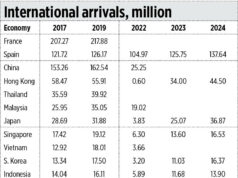THE NEW NORMAL is not just about face masks and physical distancing. It’s also upending the meanings of words and phrases. The same word may have a different meaning now. For one, the variations for taking meals have been affected, as old meanings may no longer apply, and can cause confusion.
Let’s take the hyphenated word “dine-in.” The Quarantine levels from total lockdown (we’ll push you down in your own garden) to “you-can-go-out-and-have-fun-as-long-as-you-have-a-face-mask-on” have introduced the dine-in option as a social progression from the drive-through, pick-up, take-out, and home-delivered options.
Is the old meaning of dine-in for those who check into a hotel to “wash up,” with or without driving into a garage, passé? Are hotels for now just open for those serving a quarantine sentence — Sir, we are not yet open for leisure.
In the old days (and perhaps again, in the days to come), hotels usually provide among fast-dial, single-digit numbers the code for “room service” between “housekeeping” and “bell service.”
How did the old practice of “dining in” or room service start?
The inns in Europe in the 13th century were set up to allow travelers to have a temporary place to stay. Inns did not have coffee shops, although they had pubs where one could order a roast beef sandwich or shepherd’s pie. Hours outside the pub operations were supplemented with room service.
“Room Service,” as defined in the Hoteliers’ Guide of 2009, involves ordering food already available in the menu to be delivered to a room 45 minutes after the order is placed at prices 25% higher than the lobby coffee shop price. The price premium is charged for privacy. The guest pays extra for not being seen by relatives or colleagues with a partner. Waiters delivering the trays of food guarantee a one-visit policy that eliminates the return trip. (Guests are anxious for the waiter to leave quickly and not come back as they munch on soft buns.) In the classier joints, a substantial order is delivered on a square-topped cart that folds out into a round table.
The additional table space allows the waiter to have a bigger area for salt, pepper, utensils, water pitcher, and those plate covers for the spaghetti that look like helmets with handles. Less classy places, where the garage door swings up, use Saran Wrap to cover the noodles in a tight fit.
In the new normal meaning of dine-in, such a choreographed type of service need not be practiced. It’s a simple meal inside a restaurant, with a few other people. Discretion only consists of not eavesdropping and delivering the meals efficiently.
The partners are seated diagonally from each other and can chat about the future of mankind and the fate of restaurants. Certain seats are marked with an “X” to denote that they should be left vacant.
The only kink in the new definition of dine-ins is the possible drop-by of the “food police.” These unidentified enforcers of the new normal are ready to pounce on intimate conversations, especially when carried out in a disapproved seating arrangement. Such health enforcers (not always in nurses’ outfits) may even present themselves as diners. The “mystery shopper” has been resurrected. The moment of cancelling the restaurant’s franchise in a “gotcha” moment is sure to make the news afterwards. The night serenade which features take-out meals is exempt from the prohibitions in place.
Take-outs are a lot simpler. The diner is not subjected to temperature check and a form to fill up — have you been coughing like crazy just before coming to this place? Did you visit Wuhan recently?
There is an order form (no touching) and the bill later in a box, usually with a long handle. The ordered food is taken home, or wherever, and that’s the end of that. Even the change is handed back on the same box as the bill, presumably to be fumigated afterwards.
The two options for taking meals are not mutually exclusive. The take-out can be brought to a bench in the park, or some place more private, like the back of the car and then consumed as a dine-in option.
As in everything to do with the pandemic, meanings change, but not personal relationships. Working from home strengthens the family bonding, especially when dining in on take-out food.
Tony Samson is Chairman and CEO, TOUCH xda



